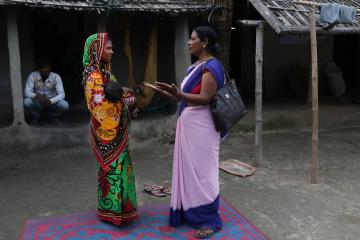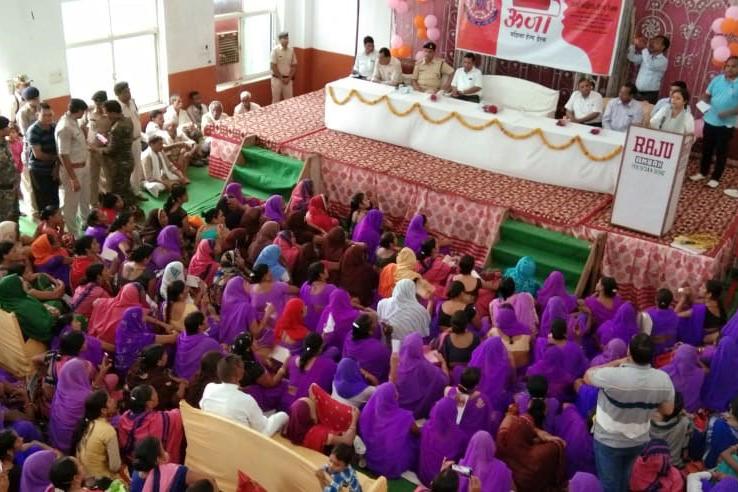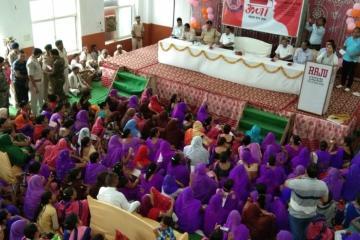
Affiliate Spotlight: Sandip Sukhtankar on his path to becoming a economist and the value of interdisciplinary collaboration

Growing up in Mumbai, Sandip Sukhtankar never imagined he would study economics—he was set on becoming an engineer, a more common path for many of his peers. But after moving to Victoria, Canada to finish high school, Sandip quickly became interested in understanding how India and Canada could be at such different stages of development. This initial curiosity, and an interest in the governance issues related to public service delivery, continue to define his work.
“It was just mind-boggling to me that the hospital in Canada was nicer than most hotels in India,” Sandip said. “I think anyone who grows up in India and ends up abroad thinks about these big picture questions, of ‘why are things so different.’”
Today Sandip is an associate professor in the Department of Economics at the University of Virginia, as well as the co-director of UVA’s Corruption Lab for Ethics, Accountability, and Rule of Law (CLEAR). He has been a J-PAL affiliate since 2011 and is a board member of J-PAL’s Digital Identification and Finance Initiative in Africa (DigiFI Africa). True to his roots in political economy, his research is primarily focused on public economics and governance issues.
An early collaboration with a public official in Odisha, India after college set Sandip on his academic path. While working on an evaluation of a workfare program, a district collector explained to Sandip and his co-author the extent to which corruption was inhibiting effective public policy.
“At that point, we started realizing that all the things we initially wanted to study were second-order because 70-80 percent of the money that was coming into this program was disappearing,” Sandip said.
Since then, he has studied corruption extensively, from examining resource extraction by sugar barons for political campaigns in Maharashtra, India as a PhD student to the role of rent expectations in deterring corruption in India’s employment guarantee scheme with fellow J-PAL affiliate Paul Niehaus. He also wrote a series of practical policy proposals with Milan Vaishnav based off of this work.
As co-director of J-PAL South Asia’s Payments and Governance Research Program, Sandip also works closely with India’s central and state governments to evaluate major reforms to social protection programs. One stream of research evaluates the impact of using biometric fingerprint identification to authenticate beneficiaries of public benefit programs, designed to ensure that benefits reach people most in need.
Synthesizing evidence from large-scale randomized evaluations and natural experiments in Andhra Pradesh and Jharkhand, Sandip and his coauthors shared broad policy lessons to inform more effective programs. emphasizing the importance of direct, regular measurement of participants’ outcomes and experiences to motivate beneficiary-centric design.
Sandip’s interest in political economy issues has resulted in several rich interdisciplinary collaborations. As co-director of CLEAR, he works with economists, political scientists, lawyers, historians, and anthropologists focusing on developing shared learnings on the causes, methods, and consequences of corruption.
“We always have to be learning. To me, interdisciplinary research is a no-brainer. Learning from my coauthors, I am able to see things I may not have spotted otherwise,” Sandip said. “If we are stuck within our disciplines, we get siloed in our particular subfields. It’s really important to go beyond that and learn from other disciplines, methods and ideas.” Simultaneously, he acknowledges the need for a common set of tools and a shared language between collaborators, including “a mutual appreciation for quantitative analysis and causal inference, as well as qualitative work to better understand the mechanisms at work.”
To students and early-career researchers seeking a similar path, Sandip’s advice is simple: “Work on what really interests you.” To sustain energy and enthusiasm throughout a career, he stressed the importance of intrinsic motivation.
“This is your life, this is something you’re going to do for a very, very long time. If you’re not interested or you’re doing something because you think it’s more ‘publishable,’ it’s going to be hard to keep working on that with the same energy and enthusiasm,” Sandip said.
For more information about J-PAL and Sandip’s research, visit https://www.povertyactionlab.org/person/sukhtankar.
Related Content

Increasing Access to Security and Justice through Women's Help Desks in Police Stations in India

Encouraging reporting of violence against women: Shifting norms, improving access


